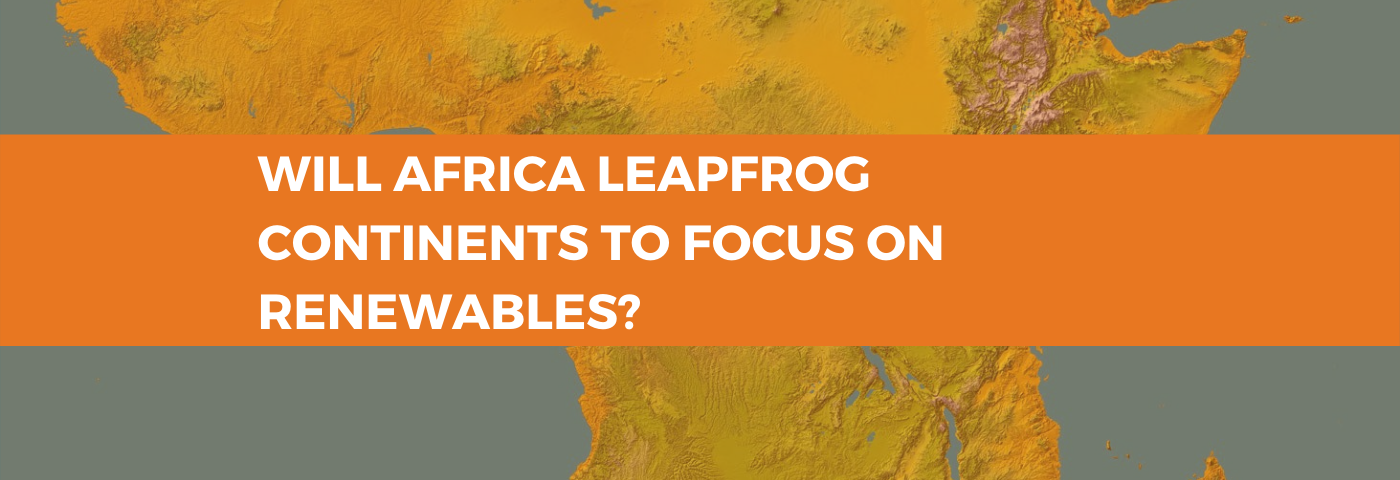Many commentators have described modern Africa as the “leapfrog” continent. For years, there has been growing excitement about Africa’s potential to bypass some of the high cost technological ‘intermediate stages’ across a number of sectors. The African ‘Mobile revolution’, which eliminated the need for expensive fixed telecom lines, moving the continent straight into the modern mobile enabled world is credited with creating this belief. In a similar vein, many commentators now believe that Africa is primed for a new energy revolution, bypassing decades of energy infrastructure expenditure and creating a renewable, off-grid energy system.
Throughout the past decade, there have been substantial advancements in renewable and off-grid energy technology. These advancements have not only dramatically reduced cost, but have increased the availability of “plug and play” energy solutions that could benefit the disconnected rural communities in Africa, in a way not previously possible. For these and many more reasons, there is a growing belief that Africa may be able to ‘leapfrog’ not just one era of electrical generation but two, skipping an absolute reliance on fossil fuels and in a number of locations, the need for a formal electricity grid itself. Fatih Birol (Executive director, International Energy Agency (IEA)) has claimed that “When it comes to Africa, I think we will see something for the first time: Namely, Africa will bring electricity to people by mainly using renewable energy and natural gas”.
Current estimates are that over 600 million people in Africa are without a source of electricity, intermittent or otherwise – to some commentators, this lack of continuous energy supply costs Africa 2 – 4% GDP growth per year. Even in the major cities, large businesses are often reliant on expensive back-up generators to prevent blackouts.
Africa has proven to be an adopter of a number of innovative systems and projects, cultivating a growing belief in Africa’s ability to ‘leapfrog’ into a key adopter of renewable energy and off-grid systems. Take, for example, the Grand Renaissance Dam currently under construction in Ethiopia – when this project is completed, it will more than quadruple the country’s current electricity-generating capacity from about 2,200MW to 8,700MW, or the 1,322MW Ingula pumped hydro scheme in operation in South Africa.
Perhaps the biggest innovation has arisen in the approach to infrastructure finance – developing unconventional means of either generating the initial capital expenditure, or absorbing some of the initial cost to the consumer. Companies such as TRINE (a Swedish crowd-funding initiative) have brought affordable roof-top solar kits to be paid in monthly instalments and M-Kopa has created “pay-as-you-go” payment models for rooftop solar PV – linked to the consumers mobile phone network to allow for easy, affordable off-grid electricity. This system has electrified more than 600,000 homes, with an average revenue per user of only $15 per month.
These large scale projects, combined with economical and geographical advantages in the continent, such as; cost of land, climate and a number of pre-existing non-powered dams that can be retro-fitted with hydroelectric capability, demonstrate that Africa has potential to create a sustainable renewable energy system, reducing reliance on current fossil fuel sources and the detrimental effect of intermittency.
While renewable and off-grid sources have the potential to bring electricity to a cross-section of Africa, there is a need to expand power generation across the continent in the most reliable, efficient and cost-effective manner. Due to availability and cost, Natural Gas is likely to feature heavily in Africa’s energy mix; however, Africa has an incredible opportunity to upscale natural gas production in conjunction with adopting a range of renewable energy sources, curbing global emissions and establishing itself as an adopter of new energy generating methods in a way inconceivable only a few years ago and cementing its reputation as the “leapfrog” continent.
Visit DWF on stand G69 to discuss the challenges facing the renewables sector in Africa, which is the subject of a new research report that they will be publishing this year.
Authors: David Gilchrist, Partner; Jonathan Forrest, Trainee.

